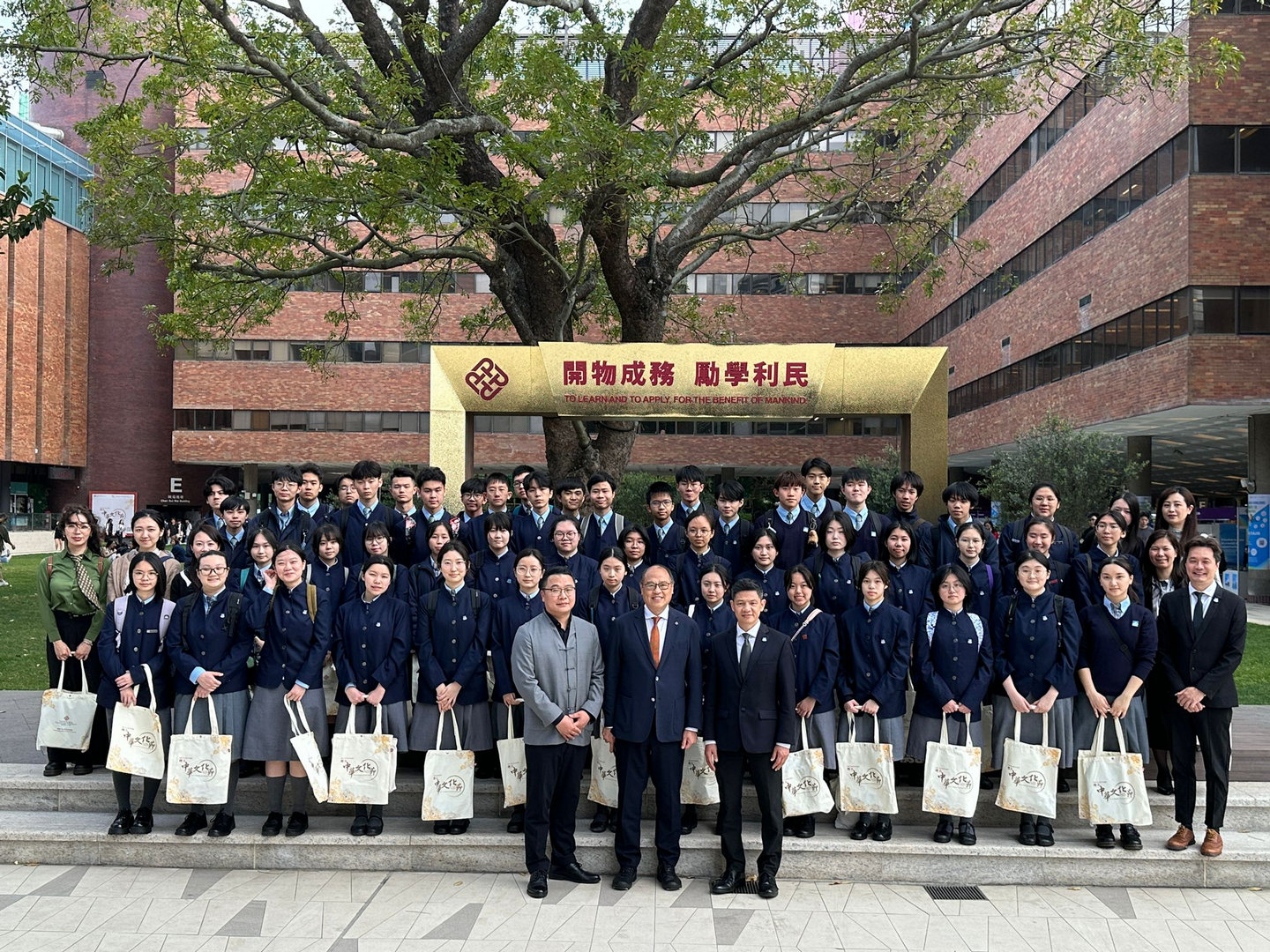Article by Our School Manager Professor Wong Kam Fai on the Learning & Teaching of NSS Liberal Studies on 29th April, 2010
English Summary of the Article written by Professor Wong on April 29, 2010
Professor Mr. Wong Kam Fai (黃錦輝教授), member of the Incorporated Management Committee of Lam Tai Fai College, expresses his view on the learning and teaching of Liberal Studies under the NSS curriculum in his article "新高中通識科 學思並行 加強指引" on 29th April, 2010. [Prof. Wong is the Associate Dean (External Affairs) of Faculty of Engineering, The Chinese University of Hong Kong, and the President of Hong Kong Information Technology Joint Council]
Upon the launch of the NSS (New Senior Secondary) Curriculum, local schools have been facing severe challenges in terms of human resources and teaching pedagogy. According to a survey conducted by the Association of the Heads of Secondary Schools (HKAHSS), 65% of schools being interviewed reflected that they did not have enough manpower to cope with the extra workload brought by the NSS curriculum, particularly from the practice of the new core subject: Liberal Studies.
Professor Wong suggests that the original purpose of introducing Liberal Studies is to offer students a platform to integrate knowledge they learn or acquire from various subjects, and to investigate them in more than one perspective. However, frontline teachers have reflected that the coverage of knowledge is too broad to comprehend while the curriculum and assessment guideline are not comprehensive or specific enough, that calls for quite a number of anxiety and uncertainties..
On the one hand, teachers have to deal with the increase of administrative work due to the Education Reform, on the other hand they have to design their own school-based curriculum and prepare teaching materials, which often include day-to-day issues and involves different kinds of media. These will all further add up the workload and aggravate the pressure of the frontline teaching staff. But do the teachings been given with adequate resources --- in terms of manpower and time --- to the provision of the best teaching to our students?
In face of the difficulty teachers encounter in teaching Liberal Studies, Prof. Wong suggests that the Education Bureau should adapt a scientific approach when designing the curriculum. For example, the curriculum can be divided into the junior and senior level: in junior secondary, methods and skills to research, gather and manage information are to be taught in senior secondary while the skills of deductive and inductive reasoning, can be introduced to students so as to preparing our students for lifelong and self-independent learning..
The survey also reveals that there was a worry that the assessment guideline of the subject is not clear enough and relies too much on the personal judgment of the markers. Instead of being merely creative, Professor Wong regards the techniques of writing the assessment in a logical approach seems to be also very important, although it is not emphasized in the existing assessment guidelines. As a result, Professor Wong urges the Education Bureau to define a more comprehensive guideline by stating the proportion of mark distribution clearly, like: 20% for creativity, writing for 30%, methods for 50%, etc.
In the words of Confucius, "To learn without thinking, one will be lost in his learning. To think without learning, one will be imperilled." Professor Wong concludes the article with a quote from Analects (《論語》) which points out the importance of both thinking and learning. Most important of all, what facilitates effective learning?
Professor Wong's Article in Chinese
新高中通識科 學思並行 加強指引
香港中文大學工程學院副院長(外務)、
香港資訊科技聯會會長
黃錦輝教授
2010年4月29日
教育界在2010年面對極大震盪,除了出現一批壓力龐大的末代會考生之外,不得不提的是已經推行數月的新高中學制。現在評論教改的成效得失仍是言之尚早,未能妄下定論。然而,教改對學界無論在資源分配或教學法上帶來的衝擊卻毋庸置疑。據中學校長會早前發表的調查顯示,六成半受訪學校認為教師人手不足或非常不足以應付新學制,另有六成半學校指推行通識科最困難,情況十分值得我們關注。筆者雖然對調查的結果不感到意外,但教改問題影響深遠,絕對不容忽視,有關當局應盡快正視及補救,避免加重老師負擔、對學生構成負面影響。
通識科旨在幫助學生在學習過程中聯繫各科的知識,能以多角度研習不同的課題,從而建構與他們的日常生活息息相關的個人知識。其本意雖好,但據該調查發現,老師認為通識科共設六個單元,範疇涵蓋面大、新聞議題太多,卻缺乏明確的課程和考核指引。
這學年正值推行三三四新學制的第一年,教師單是應付轉制帶來的額外行政工作已透不過氣來,因此還要他們就通識科重新編制課程及教材,必然是百上加斤。再者,在現階段就算教師能不眠不休地完成教材,他們也未必懂得如何評分。筆者曾接觸一所學校的通識科教師,他雖成功向校長爭取聘請外援專責蒐集並教授新聞議題,但經過眾人討論如何教學和評分後,仍然無從入手、困難重重,皆因欠缺清晰指引。
此外,老師是否有足夠時間與學生詳盡分析新聞事件背後的不同角度和層面呢?例如早前鬧得熱哄哄的「高鐵」事件,據筆者瞭解,有老師帶學生到立法會親身感受「社會與文化」。不過,筆者懷疑學生們感受過後是否能夠全面消化從中所獲取的信息呢?在夾雜不同立場的吶喊聲中,若然同學為走捷徑,不去深入思考及探索事件的來龍去脈,就接納某一方的片面之詞,而同時再加上老師因缺乏足夠時間而未能引導同學從多角度去分析事件背後的論據的話,這便會很容易導致學生對事件產生誤解。那麼通識教育的意義又何在呢?
歸根究底,筆者認為,當局應把通識科設計得更科學化一些。首先,將課程分為初中、高中教材,在初中階段集中教授如何整理資料、認識資訊管理知識,例如尊重知識產權、上網安全認知等。新高中通識科課程結構包含六個單元、三大範疇,都是縱向發展,實在需要橫向發展來配合,例如方法論、推理、歸納與演繹等論證法,都屬於應用邏輯技巧。現今互聯網世界訊息氾濫,有必要將科學的思考方法引入高中階段,讓同學在沒有老師的指引下,仍有能力自行分析思考問題。
調查也反咉出通識科缺乏明確的考核指引。假如一個學生富創意地回答一道通識問題,但答案卻有點離題,有老師可能會側重欣賞其創意性而評之及格,但反過來亦可能會有老師執著其離題而評之不及格。以後者為例,筆者認為教師評分時也應考慮學生在答案中所運用的邏輯技巧。現行的評分方法難免使學生就無所適從。因此局方有必要盡快制定指引,例如學生創意及個人意見佔20%;行文格式30%;方法論50%,而不是如現有的做法,只是空泛地羅列可評分的範疇。
《論語》有云:「學而不思則罔,思而不學則殆。」學與思,同樣重要。因此學生在修讀通識科時,切忌「學而不思」,不求甚解,否則便會弄巧反拙,最終做成既不通亦不識。





 Hong Kong Primary Schools Fencing Invitation Championships 2024
Hong Kong Primary Schools Fencing Invitation Championships 2024









